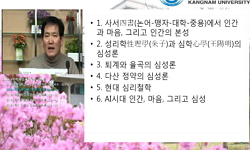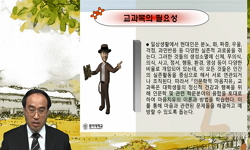The basic consciousness of Hwaseo's Neo-confucianism is that he can not leave this world to the presidency of Ki, and thus he is defining mind as Li (以理斷心). Sungjae (省齋) actively accepted this problem consciousness. However, he criticized ...
http://chineseinput.net/에서 pinyin(병음)방식으로 중국어를 변환할 수 있습니다.
변환된 중국어를 복사하여 사용하시면 됩니다.
- 中文 을 입력하시려면 zhongwen을 입력하시고 space를누르시면됩니다.
- 北京 을 입력하시려면 beijing을 입력하시고 space를 누르시면 됩니다.

화서(華西) 심설(心說)에 대한 성재(省齋)의 조보(調補)와 그 의의 = Hwaseo’s Theory of Mind and Sungjae’s Supplementary Explanation on It
한글로보기https://www.riss.kr/link?id=A106302809
- 저자
- 발행기관
- 학술지명
- 권호사항
-
발행연도
2019
-
작성언어
-
-
주제어
화서 ; 華西의 심설 ; 마음 ; 성재 ; 省齋 ; 이리단심 ; 以理斷心 ; 조보 ; 調補 ; Hwaseo’s theory of mind ; mind ; 心 ; defining mind as Li ; Sungjae ; supplementary explanations
-
KDC
100
-
등재정보
KCI등재
-
자료형태
학술저널
-
수록면
101-134(34쪽)
- DOI식별코드
- 제공처
-
0
상세조회 -
0
다운로드
부가정보
다국어 초록 (Multilingual Abstract)
In fact, Hwaseo's theory is based on the idea that Li is good and Ki is bad (理善氣惡論), and completely disregards Ki. He pursued a world made up of Li only by promoting Li from self-centeredness, into a self-existent being. This is very far from the general theory of Neo-confucianism. In traditional Confucianism, there is no way of thinking that Li is good and Ki is bad, but the general theory of neo-confucianism is that emphasizes the complementary combination of Li and Ki.
However, as a result of the attempt to complement the problems of Hwaseo's theory, Sungjae's theory seems to have failed to secure theoretical consistency by making a compromise between the general theory of the Neo-confucianism and Hwaseo's argument.
The basic consciousness of Hwaseo's Neo-confucianism is that he can not leave this world to the presidency of Ki, and thus he is defining mind as Li (以理斷心). Sungjae (省齋) actively accepted this problem consciousness. However, he criticized Hwaseo's defining mind as Li for the reason that it is against the doctrines of the scriptures and Confucian scholars, and can cause many illnesses. In this context, Sungjae has raised the necessity of supplementary explanations on Hwaseo's theory of mind.
In fact, Hwaseo's theory is based on the idea that Li is good and Ki is bad (理善氣惡論), and completely disregards Ki. He pursued a world made up of Li only by promoting Li from self-centeredness, into a self-existent being. This is very far from the general theory of Neo-confucianism. In traditional Confucianism, there is no way of thinking that Li is good and Ki is bad, but the general theory of neo-confucianism is that emphasizes the complementary combination of Li and Ki.
However, as a result of the attempt to complement the problems of Hwaseo's theory, Sungjae's theory seems to have failed to secure theoretical consistency by making a compromise between the general theory of the Neo-confucianism and Hwaseo's argument.
동일학술지(권/호) 다른 논문
-
율곡의 주재자론(主宰者論)-「별홍표숙호서(別洪表叔浩序)」를 중심으로-
- (사)율곡연구원
- 곽신환 ( Shin Hwan Kwak )
- 2019
- KCI등재
-
율곡(栗谷)의 애도시(哀悼詩)에 나타난 추모의 형상화(形象化) 방식(方式)
- (사)율곡연구원
- 고명신 ( Ko Myoung-shin )
- 2019
- KCI등재
-
『동호문답(東湖問答)』을 통해 본 안민(安民)의 양생론(養生論) 연구
- (사)율곡연구원
- 김희 ( Hee Kim )
- 2019
- KCI등재
-
인물성동이논쟁(人物性同異論爭)의 논거(論據) 분석(分析) - 리간(李柬)·한원진(韓元震)·임성주(任聖周)를 중심으로
- (사)율곡연구원
- 손흥철 ( Son Heung-chul )
- 2019
- KCI등재





 KCI
KCI KISS
KISS






